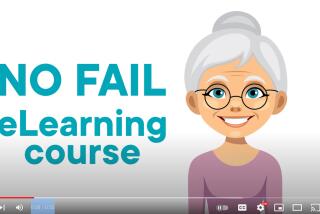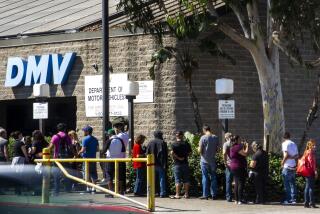Gay Traffic School Finds Niche in Big-Ticket Market : Regulations: California drivers use the sessions as an alternative to expensive citations and increased insurance rates. As long as schools follow the DMV curriculum, they can emphasize comedy or lifestyle to get the points across.
- Share via
LONG BEACH — Traffic school was in session, and A.J., a former California Highway Patrol officer who was instructor this day, had covered several basic concepts of safety on the highways: driving defensively, anticipating dangerous situations, recognizing potential distractions.
Next it was time to test the class members’ observational powers and knowledge about the branches of law enforcement they are likely to encounter every day.
“What do Highway Patrol officers’ uniforms look like?” she asked.
“Oh--hot sometimes,” Peter Munneke responded quickly. “Tight and tailored. Those sandstone brown belts are a real turn-on.”
The other 25 students erupted with laughter on a recent Saturday morning, as they sat on the patio of a popular gay bar where the course is offered twice a month. But it was the laughter of comfortable familiarity, not the giggles of nervousness or derision.
This is a typical day in gay traffic school, a new twist on an institution that for more than three decades has been popular with California drivers as an alternative to that $95 speeding ticket and the increased insurance rates that always accompany such vehicular transgressions.
During the ‘80s, many privately run schools--which most California courts will allow traffic violators to attend instead of paying fines--turned to comedy to make this form of detention a little less painful (Lettuce Amuse You Comedy Schools Inc., Whee-l Make U Laff Great Comedians, Laffs R Us, etc.).
In conducting these refresher courses in the finer points of the state Vehicle Code and general traffic safety, other schools tailor classes to drivers who are not proficient in English.
But in 1989, the owners of Costa Mesa-based Academy Traffic School came up with another target audience: gay and lesbian drivers.
“There are Japanese, Spanish, French and Hebrew traffic schools,” said Helene Lorenz, who owns and operates the school with her daughter, Beth Singer. “Last year Beth asked me, ‘What would you think of gay traffic school?’ and I thought it was great.”
The school, approved by the state Department of Motor Vehicles , now offers sessions in 10 locations, from San Diego to San Francisco. The company grosses about $200,000 annually and plans to open three more locations this year, Singer said.
After phasing out the driving school side of the business, Lorenz and Singer changed the name to Finally A Gay Traffic School. Since receiving DMV certification earlier this year, it is on a list of hundreds of approved traffic schools.
But, Finally a Gay Traffic School is an option for county offenders only if they get their tickets in South County or beyond the county line. Because Orange County is one of three in California that has an exclusive contract with a single traffic school, a contract that covers most court jurisdictions, Central and North County courts assign eligible drivers only to that one school.
Participants pay the court a fee to enroll in traffic school--usually about $25--then pay the school itself another fee that ranges from about $20 to $35, depending on the school. For most, that still costs less than the fine. Depending on the court, though, violators may be assigned to an eight-hour class (the DMV’s stipulated minimum) or for 12 hours of instruction.
DMV spokesman William Gengler said that while traffic schools have been operating since the late 1950s in California and are used by traffic-court judges as a way “to lighten their court burden,” it has been only since 1985 that schools were required to be licensed by the DMV and held to a standard curriculum.
School instructors are also individually tested and licensed by the DMV, he said.
It does not matter how the material is presented, Gengler said, “as long as they are presenting the curriculum as outlined.”
At Finally A Gay Traffic School employees answer the phone innocuously enough (“Traffic school”) but, Lorenz said, callers are always told that the classes are aimed at gays.
You don’t have to be gay to attend. In fact, the Long Beach course led by A.J.--like all the school’s instructors, she is gay--included a few straights who had selected it primarily because it was close to home.
Men outnumbered women about 2 to 1, but Lorenz said that was less a reflection of its appeal to the gay community than to men generally being ticketed more often than women.
Most, however, were gays and lesbians who learned about Finally A Gay Traffic School through its ads in the gay press, flyers distributed at gay bars, other businesses and at gay pride festivals.
Theresa, who lives just four blocks from the downtown bar where Long Beach sessions are held, said: “I just wanted to go somewhere close. I’m glad I got this one. She (A.J.) is really nice. I hear some traffic school instructors can be like drill sergeants.”
A drill sergeant A.J. isn’t, although with her muscular build and Highway Patrol training, she probably could give one a run for his money. (She left the CHP after a traffic accident rendered her left leg unfit for duty, and has since been teaching traffic school.)
Instead, she kept the atmosphere informal and, over the course of the required 400-minute session, invited each student to give his or her name, then recite the offense, which led to varied stories that one would expect in traditional traffic school--except that the jokes, examples and anecdotes that surfaced through the day were mostly oriented to the same sex.
“I got mine for speeding. I was doing 70 on the freeway because I was talking to a friend about a girl I liked, and he snagged me,” Sally said.
Jokes about the arresting officers became a common source of humor throughout the day. “I didn’t stop going around a curve, and she gave me a ticket,” confessed a Long Beach woman who asked to be identified as Vicki.
“She was very cute” she added, her smile turning to a frown, “but I think she was straight.”
Later, when A.J. introduced a third video on traffic safety, and announced, “This is a Marine training film,” several of the men chimed in “All right!”
Notwithstanding the many one-liners that helped lighten the deluge of facts and figures, most participants said the primary appeal of the school was an atmosphere in which they could feel comfortable.
Some said previous experiences with comedy-oriented schools proved less than a laugh riot, so they were looking for something different this time. (California law allows offenders to attend traffic school, resulting in the ticket being purged from their driving record, just once every 18 months.) A few, however, said they also thought it might present an opportunity to meet new people.
While all traffic schools must adhere to the standard DMV curriculum, the context in which it is presented raises issues of special interest to gay drivers.
In a segment of sharing stories, during which the instructor stressed the importance of regular automobile maintenance, Peter Munneke, 59, said he had taken his car to a particular mechanic because “he had advertised his ‘gay-owned, gay-operated shop.’ He ripped me off big.”
When asked by others in the class to identify the mechanic, Munneke demurred, saying, “That wouldn’t be cool.”
But the others didn’t let up: “If it was a straight guy, you’d tell us in a New York minute!” one argued.
Eventually, Munneke relented and, without revealing the name, gave his classmates enough information so they might figure out which business it was if they wanted to avoid the problems he had encountered.
On the other hand, many comments and reactions were exactly what you would expect of any audience. When Michael of San Diego announced that he had been cited for driving solo in a car-pool lane, he elicited the heartiest round of boos heard all day.
Randy Calcetas, an insurance claims adjuster from Long Beach, said about the school: “I wanted to see what (the class) was like. I wanted to see how legitimate it was. You see a lot of gay this and gay that, but sometimes it just turns out that it’s no good.”
Sharon Lee Taylor, also of Long Beach, came to the session after learning of the school from Calcetas at a South Coast Chorale rehearsal.
“The most important thing to me was the more comfortable atmosphere,” Taylor said. “You don’t have to pretend or play the straight role. It’s more relaxed, and therefore you are more receptive to hearing what’s being said.”
More to Read
Sign up for Essential California
The most important California stories and recommendations in your inbox every morning.
You may occasionally receive promotional content from the Los Angeles Times.













